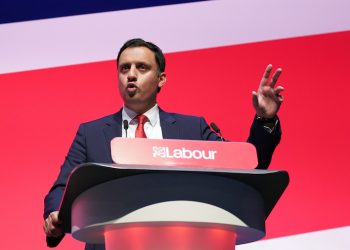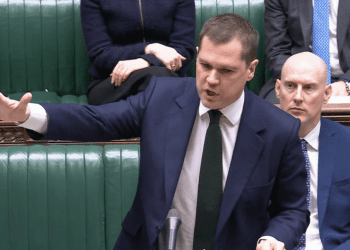Another week, another capitulation courtesy of Keir Starmer. Downing Street’s panicked response to criticism of the welfare bill would suggest it was ambushed by a clandestine cadre of guerrilla rebels. The reality is more damning. Mutinous sentiment had been swelling for months, in plain sight, before the publication of veteran MP Meg Hillier’s “reasoned amendment” on Monday: it marked a messy denouement after months of miscalculations and steadily souring relations within the Labour Party.
Starmer’s climbdowns are coming faster — and importantly thicker. The winter fuel U-turn had already set the exchequer back by £1.25 billion. The price of the government’s welfare reversal is said to be around £3 billion (Institute for Fiscal Studies).
The prime minister’s extensive, expensive concessions reflect the scale of internal discontent, and the overwhelming imperative to avoid defeat. The last time a government lost a vote at second reading — a fate the Universal Credit and Personal Independence Payment Bill faced on Tuesday — was almost 40 years ago.
The defeat of the Shops Bill in 1986 came in the seventh year of Margaret Thatcher’s government after 72 Conservative backbenchers defied a three-line whip. By the time Hillier withdrew her reasoned amendment, it had 126 Labour signatories, a third of the Parliamentary Labour Party (PLP).
The customary lifespan of a government reflects a slow decay, as the PM’s authority gradually degrades over years of parliamentary friction and electoral setbacks. Eventually, prime ministers succumb to the same doom spiral: the political costs of governing have a direct corrosive effect on party discipline. Voter fatigue, the looming threat of electoral retribution and a general sense of insecurity create a permission structure for MPs to rebel. This disunity drives a government’s unpopularity — which in turn reinforces the incentives for revolt. Over time, the traditional tools of party management, wielded by the whips, lose their potency.
As such, it is wrong to consider the act of “rebellion” as an isolated event. Dissent is a cumulative process, where the capacity for defiance grows with each successive revolt.
The first rebellion, the most politically and psychologically difficult, is a watershed moment. A culture of defiance can become institutionalised within a party. The tools of rebellion — the connections, the organisational structures, the caucuses, the WhatsApp groups — do not dissolve when some concession is finally granted. They lie dormant, ready for the next fight.
Simultaneously, once an MP has participated in rebellion, the incentive structure they face is permanently altered. First-time rebels will have forfeited their chances of promotion. The whips cannot be seen as rewarding dissent. And so the government can no longer flaunt its powers of patronage.
First-time rebels usually rebel again.
Crucially, whoever prevails and participates in a rebellion, the political baggage is carried onto the next phase of government. Those who initially deferred to the whips office in a first contentious vote will prove less persuadable when it comes to the next confrontation. Think of those MPs whose winter fuel concerns were initially waved away by the whips.
Parliamentary parties, then, respond to pressure by ratcheting towards rebellion. And the revolts tend to increase in severity: the accumulating political baggage, the steady erosion of authority, the normalisation of disloyalty, a “safety in numbers” dynamic, the growing unpopularity — all force MPs against their prime minister.
After a point, rebellion is no longer unthinkable — or even a last resort. It is a primary tool of negotiation.
***This content first appeared in Politics.co.uk’s Week-in-Review newsletter, sign up for free and never miss this article.***
This, 358 days into his tenure as prime minister, is the political settlement Starmer now faces. The events of this week are not just a political embarrassment. They are an unprecedented acceleration of a well-documented process of political decay. And few believe that government is about to get easier for Labour.
Starmer has shifted before, of course. But the welfare rebellion is significant because it reflects a total failure of his party management playbook, at a scale hitherto not seen. The prime minister’s first and perhaps most telling miscalculation this week was that he mistook the welfare rebellion as another winnable and symbolic fight with his party.
Starmer established his authority in opposition not by suppressing dissent — but by weaponising it. From 2021-2024 in particular, the Labour leader manufactured managed confrontations with his own MPs. Starmerism has always embraced its countervailing forces.
The wails of the dispossessed were seized upon for their symbol potential. The prime minister did not alter this script upon entering government. In one of his first acts as PM last July, Starmer exiled seven MPs for backing an SNP amendment to the king’s speech calling on the government to scrap the two-child benefit cap. The whip was later restored to four of the seven rebels in a surgical divide-and-rule operation.
This week, true to form, Starmer cast himself as strident and imperious. The welfare debate was imagined as another exercise in his party’s ideological re-education. Work and pensions secretary Liz Kendall extended an “olive branch”, confirming a longer transition period for those set to be stripped of their Personal Independence Payments (Pip). (The move echoed the announcement of a child poverty taskforce last year — a limited concession to provide anxious rebels with an off-ramp).
But behind the scenes, Starmer’s political operation worked ruthlessly to ensure MPs understood the consequences of rebellion. Labour parliamentarians were once more threatened with suspension, the prospect of never acquiring a ministerial red box, and even deselection.
But these heavy-handed tactics came from a position of weakness, not strength. Crucially, the approach significantly overestimated Starmer’s standing among Labour MPs — and underestimated rebel resolve. As late as Wednesday afternoon, the prime minister dismissed the protests in his party as “noises off”. His stubborn dismissiveness ensured the situation spiralled further.
Was Starmer unaware? The reasoned amendment’s signatories were not the “usual suspects” of irreconcilable rebels. Hillier is a widely respected select committee chair, veteran MP and former minister. Toby Perkins, who added his signature to the amendment on Thursday as the revolt’s numbers grew, ran Kendall’s campaign during the 2015 leadership election.
Meanwhile, the rebellion encompassed the “soft left” (Rosena Allin-Khan, Louise Haigh), the Blue Labour caucus (Jonathan Brash, Connor Naismith) and the Socialist Campaign Group (Diane Abbott, Richard Burgon). All shades of Labour opinion were represented.
This was a revolt of all factions and none.
Haigh, the former transport secretary, and Vicky Foxcroft, who resigned as a whip last week, were among the original signatories. 13 select committee chairs backed the amendment. And upon the amendment’s publication on Monday evening, a majority of its backers (59) were members of Labour’s 2024 intake. So much for the “Starmtroopers”.
The power of the rebellion was its heterogeneity. No characteristic — geography, electoral majority, seniority, ideology — was a reliable indicator of an MP’s position. The signatories were a near-perfect cross-section of the Labour Party.
In dismissing the rebellion as mere “noise”, Starmer exposed a dangerous ignorance of his own party.
A common rallying cry of Labour’s rebels has been that the prime minister is aloof to their concerns and unwilling to engage. Starmer has voted just seven times in his first year as PM; two of those came on the assisted dying bill, a non-partisan conscience issue. According to BBC analysis, Rishi Sunak voted 22 times, Boris Johnson 57 times, Theresa May 53 times, David Cameron 37 times, Gordon Brown 41 times and Tony Blair 13 times in their first years.
This matters. Firstly, it means the prime minister has not been regularly rubbing shoulders with his MPs in the commons voting lobbies — something prime ministers, historically, have used as an unofficial opportunity to engage with colleagues or, at least, signal their attentiveness. It’s a chance to show solidarity with MPs (a pertinent point in this era of “tough decisions”, one would assume).
In a more abstract sense, this attitude suggests Starmer feels insulated by his massive working majority (165). That would explain why the prime minister does not overly concern himself with his more unofficial parliamentary duties — which are nonetheless crucial. His self-perception of safety has fostered an aloofness that extends far beyond the voting lobbies.
Neil Duncan Jordan, the Labour MP for Poole, revealed this week that he is yet to actually meet the prime minister. “I’ve never actually had a conversation with [Starmer]”, he told the BBC.
Duncan Jordan has been critical of the government since his election in 2024. But individual MPs matter, be they the never-possessed, the dispossessed or the otherwise generally discontented. As prime minister, Tony Blair worked hard to maintain cordial relations with left-wingers. He was even happy to bring some — Clare Short, Dawn Primarolo and Chris Mullin — into government.
The prime minister’s disdain for the Westminster bubble is famous. In a January 2023 interview with the News Agents podcast, Starmer revealed — with barely a moment’s hesitation — that he would “choose” Davos, the seat of the World Economic Forum, over Westminster. The Labour leader clarified: “Because Westminster is too constrained, it’s closed and we’re not having meaningful — once you get out of Westminster… you actually engage with people you can see working with people in the future — Westminster is just a tribal shouting place.”
This position isn’t just a revealing intellectual preference — but a clear political vulnerability. Starmer has neglected his responsibilities in parliament and failed to carry his MPs with him.
This was one of Rosie Duffield’s (many) criticisms when she resigned the Labour whip last September. “You have never regularly engaged with your own backbench MPs”, she wrote in her resignation missive. “You have chosen neither to seek our individual political opinions, nor learn about our constituency experiences, nor our specific or collective areas of political knowledge. We clearly have nothing you deem to be of value.”
***This content first appeared in Politics.co.uk’s Week-in-Review newsletter, sign up for free and never miss this article.***
The relationship between a prime minister and their MPs is mutual and, to a point, transactional. Starmer has not dedicated much time to relationships in his (vast) parliamentary party since July last year. MPs feel isolated, both from the prime minister and the policy-making process. They are passive recipients of diktats from a detached leadership, rather than active political partners.
Given this dislocation between MPs and the prime minister, it is hardly surprising No 10 and the parliamentary party are out of step politically. Starmer’s challenge over the coming months will be to give Labour MPs a stake in policy development and a sense of ownership over the government’s programme. After all, a prime minister derives their authority, and their ability to govern, from parliament.
This touchy-feely approach to party management is important, but it’s only part of a formula that Starmer is roundly failing to execute. Just as significant, if not more so, is a prime minister’s ability to persuade their MPs of a policy’s political meaning. All else being equal, backbenchers must be convinced as to the virtues of a policy and how it contributes to, and features within, the government’s vision.
This is where Starmer comes seriously unstuck: there is no identifiable positive framework informing his policy choices. The government’s welfare policy, as of the concessions exacted on Friday evening, is to exempt existing Pip claimants from changes to eligibility. Meanwhile, the health element of universal credit will now rise with inflation, after the original plan was to freeze the payments at £97 a week until 2029/30 for existing claimants.
It is worth considering, in full, the policy-making process that brought about the final form of this flagship piece of legislation.
On 6 March, the Times reported that the welfare package had still “not been agreed” ahead of the spring statement later that month “amid a continuing dispute about how these savings will be spent” between chancellor Rachel Reeves and Kendall.
On 25 March, the Times reported that Reeves had been forced to make further cuts after the Office for Budget Responsibility (OBR) found the final package would only save £3.4 billion, rather than the £5 billion the government hoped. The OBR said the government’s package “was received late and without sufficient detail.”
The revised proposals were unveiled at the spring statement the following day. The package of savings worth £4.8 billion restored the chancellor’s fiscal headroom to the exact position initially carved out at the autumn budget: precisely £9.9 billion against her main fiscal rule.
Earlier this month, in the face of a rising backlash, Kendall unveiled her first “olive branch” by way of a longer transition period for Pip claimants. The rebels rejected the concession and successfully held out for the far-reaching compromises on Thursday.
Suffice it to say, there is no political meaning to this process. It reflects a series of haphazard compromises born of rushed negotiations and arbitrary deadlines. No kind of positive vision is discernible at any stage. In fact, the imperatives of the policy appear deeply confused. Reeves first chased savings in order to appease the OBR; but then conceded these savings, and more, as part of the government’s concessions to its rebels.
There is a remarkable resemblance to Labour’s winter fuel payment fiasco — which saw a revenue-raising measure drastically rolled back in the face of internal discontent.
The position the government now finds itself in is this: after the winter fuel and welfare U-turns, Starmer can no longer credibly claim future “tough choices” are based on unshakeable principle. He has now implicitly invited the party to negotiate on every single piece of difficult legislation. The rest of his premiership could be characterised by complex patterns of bargaining and accommodation. In the medium term, the twin “black holes” opened by the winter fuel and welfare climbdowns will need to be filled. He must do so in a way that appeases both the OBR and Labour MPs — a balance he has roundly failed to strike thus far.
Starmer’s authority is under significant strain. His own MPs doubt his judgement. His political antennae failed to pick up the burgeoning threat posed by a third of his parliamentary party. He is, rebel testimony suggests, a little-seen prime minister overseeing a distant, dismissive and dysfunctional Downing Street operation.
Meanwhile, the sense of instability — of incompetence — will prove politically sticky. It is eerily reminiscent of the decadence of late Conservatism: the stubbornness of Liz Truss; the bunker mentality of Rishi Sunak.
Starmer’s limited platform at the 2024 general election heralded Labour as a harbinger of stable governance. That means he is uniquely exposed to any suggestion of “psychodrama”. And we saw more than a suggestion of political crisis this week.
It is all seriously sub-optimal as Westminster readies to mark the upcoming anniversary of Labour winning power next week. Starmer’s greatest challenge now is to prove, beyond doubt, that his government has not already fallen into the very cycle of crisis and decay he vowed to end.
Josh Self is editor of Politics.co.uk, follow him on Bluesky here and X here.
Politics.co.uk is the UK’s leading digital-only political website. Subscribe to our daily newsletter for all the latest news and analysis.
The post Week-in-Review: Welfare rebellion has permanently damaged Starmer appeared first on Politics.co.uk.

































